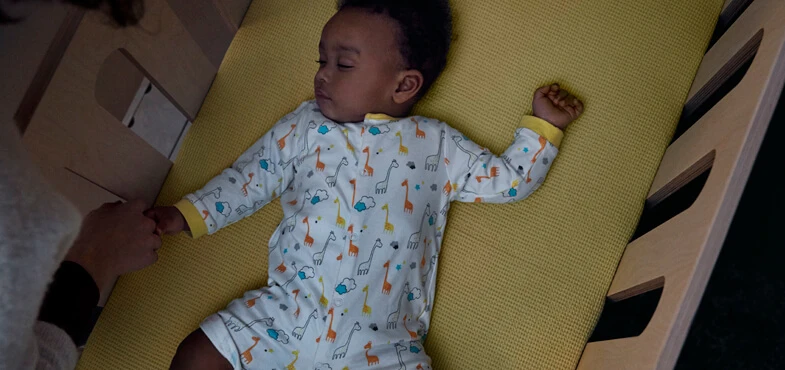Newborn Sleep: 0 to 3 Months

The first night home may feel overwhelming, but to try and help ease you into it, read our helpful guide. Newborns sleep a lot, but not for very long at any one time. Thankfully, there are ways to help ease your newborn into a regular schedule with quiet moments together where you can engage baby's senses to help promote sleep and aid happy, healthy development. The first few weeks of your baby’s life are all about adjustment — for your baby and you. It’s too soon to expect structured sleep patterns, so take your cues from your baby.
Newborns Wake Up - A lot
For the first few months, your baby will fall asleep and wake up at all hours of the day (and night!). Newborn babies can have quite a range in total sleep time (10-18 hours per day), with sleep usually equally spaced throughout the 24-hour day with no real difference between day and night-time sleep. Babies may sleep 3 to 4 hours at a time. Be sure to respond to your newborn when they signal, as they are likely to need feeding…and changing!
Why Your Newborn Wakes Up
Your newborn most often wakes up because they are hungry or need to be changed. Be aware of sudden changes in your baby’s sleep patterns — it may indicate illness or a hunger-inducing growth spurt
Every Baby is different
Learn your baby's signs of being sleepy. Many babies become fussy or cry when they get tired, while others will rub their eyes, pull on their ears, or even stare off into space. Put your baby down for bedtime or a nap when your baby first lets you know they are tired.
Teach the Difference Between Night and Day
When your baby sleeps during the day, keep the lights on and keep sounds at normal levels. At night, on the other hand, turn off the light or use a night-light, feed and change your baby as calmly and quietly as possible, and limit your interactions to holding them gently. Soon you will notice your baby's longest periods of sleep occur at night.
Naptime — For Mum Too
Use your baby’s naptime as a time to catch up on sleep yourself. As tempting as it is to use naptime to get things done, you’ll be able to cope better if you nap when your baby does.
Establish a Bedtime Routine
Babies are comforted by routines. You may wish to begin establishing a bedtime routine even at this tender age, to lay the groundwork for later months. For example , try regularly giving your newborn a warm bath, a gentle, soothing massage and quiet time before bed. This can help to relax your newborn for easier sleep.
SIDS (Sudden Infant Death Syndrome)
To lessen the chances of SIDS, always put your baby down to sleep on their back, not their tummy. Your baby should sleep on a firm mattress, with no fluffy or loose bedding, no stuffed animals, and no pillow.
For more on baby sleep safety, visit NHS Choices on reducing the risk of SIDS
You Might Also Like...

Download the JOHNSON’S® BEDTIME™ App
Keep our baby sleep expertise at your fingertips
Good Nights Sleep
Discover the 3 easy steps of our proven bedtime routine.

Baby Bedtime Range
See our proven mild & gentle bedtime range, which can help baby sleep better as part of a nightly routine.
JOHNSON'S®Pioneering Safety and Science in Baby Care
We are committed to working with Parents, Healthcare Professionals and Scientists to ensure our baby products continue to deliver high standards of safety and care.






